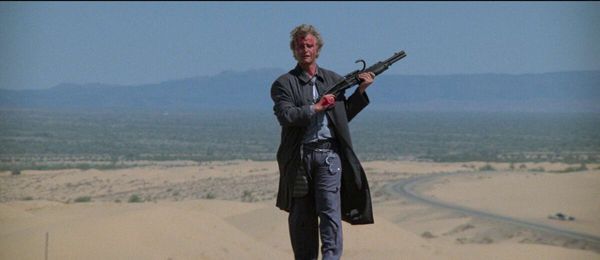 |
| Rutger Hauer in The Hitcher |
Currently celebrating its 30th anniversary, Robert Harmon’s The Hitcher is one of those films that leaves an indelible mark on the viewer. The concept is simple – a young driver crossing the desert (played by C Thomas Howell) is targeted for a game of cat and mouse by a ruthless stranger (played by Rutger Hauer) – but somewhere along the way, a kind of magic happens, and it emerges as much more than the sum of its parts. Although it was underappreciated on its release, like many a film seen first and foremost as horror, word of mouth gradually saw it established as a classic. I was delighted to have the opportunity to discuss it with director Robert Harmon, for whom it was a feature début which exceeded all expectations.
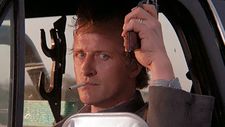 |
| The Hitcher |
“I still can't believe it,” he says. “It's fantastic. I remember working on a film in very rural Canada. I was in the middle of a wheat field. There was nobody around – I was scouting for something – and some guy came running across the field and said ‘Somebody told me that you directed The Hitcher!’ Even then, it was 25 years after the movie was released. And I said ‘Yes, I did,’ and he had brought a pad and a pen to get an autograph. I thought ‘This is crazy.’
“I don't really know that I understand it myself, but I have a theory in that it didn't spoon feed the audience a lot of expository backstory. Just the right note of mystery. You learned only what you needed to learn, and none of the traditional, almost de rigueur sort of ‘Oh, you know, this is how he turned out that way. He was like this,’ and all that stuff. Who cares? It's not about that. It's about these two guys.”
I tell him that some of what has always interested me about it is the suggestion that the titular hitcher, John Ryder, isn't really a human being – like he represents some primordial force of nature. So it has that mythic quality that stays with people.
“Well put. I totally agree. I had a catchphrase during the entire production of the movie so that everybody understood exactly that. The way I put it was: Jim Halsey is driving down that two lane highway in the middle of nowhere in the rain. Had he not driven down that highway, Rutger was not standing there. And had he driven down a different highway, that's where Rutger would have been. I mean, he's exactly right. He is a person. I don't think he's a supernatural figure, but he's right on the edge, and it's very easy to easily make the case that there was something spectral and wraith-like about him.”
At the time, a lot of people compared the film to Duel, which was still relatively young at that point. In Duel, we never see more than a snakeskin boot to tell us that there is another person involved. When making The Hitcher, how did he capture those interesting elements whilst creating something distinctive?
“That was easy,” he reveals, “because I'd never seen Duel. I only saw Duel after The Hitcher was released. And people were saying, ‘Oh, it reminds me of Duel.’ I thought ‘I’m a Spielberg fan. I should see this movie.’ And I watched it. You could easily see why those comparisons were made, especially to the point that you made that because we never see the driver of the truck. That gives him a certain unearthly power that he wouldn't have if it was just some guy driving a truck. There’s exactly the same concept at work there.”
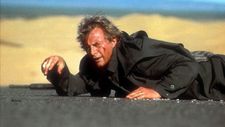 |
| The Hitcher |
I ask what stood out to him about Eric Red’s script for The Hitcher.
“A couple things, one of which is vaguely interesting, I think. One is that I wanted to do this work since I was a little kid, before I even knew really what a director did. I just loved movies as a kid, and I always had some sense that ‘I want to do that,’ whatever that is. I didn't really know what a director was. Had I known, I might not have wanted to do it.” He laughs. “But no, it's all worked out very well. But so in order to do that, I wrote and directed a short film, to take me from what I had been, which was a photographer and cinematographer, into a director, as a kind of calling card. And it worked so fast, it startled me. I got a really powerful agent immediately and offers started coming in. But the scripts were terrible. I must have passed on four, five, eight projects.
“I thought to myself ‘This is nuts. I wanted to do this all my life. Now people saying “Here you go,” and I'm turning everything down.’ And then I read The Hitcher. So not only did I respond to it, but I also got to say yes to something. This was very amazing. And again, we were talking about the elements that were in the movie that people have responded to in a certain way. Certainly some changes were made, but it had this very different rhythm to the dialogue. There's a word for that kind of dialogue, and I've forgotten what it is, but very clipped. Word, word, word. All that kind of stuff. That's very unusual in a Hollywood script.
“I liked the elemental nature of it. My short film was about somebody in the middle of nowhere having a series of little things going on that weren't very pleasant. It was a little bit Hitcher-like, oddly enough. So it was all those things, but certainly 50% of it was ‘I better say yes to something before people stop asking.’”
He’s spoken before about how he worked on that script to strip it down, making it more straightforward. less elaborate and less gory – but then there’s the direction, which achieves something similar. A lot of what we see Ryder do involves very small, easy movements, which makes him seem more powerful – he can do a lot of damage with very little effort.
“Yeah, there were some, you know, what you might call purely directorial aspects – but I was also a first time director without a giant budget. So I'm always of the feeling, let's do less, better spread whatever budget we have over the whole film. There's a whole bunch of other action stuff that seemed to me a little over the top. Forgive me, Eric, but we sort of get that the John Ryder character is capable of all kinds of things, and there's a couple of sequences that were not going to be cheap.”
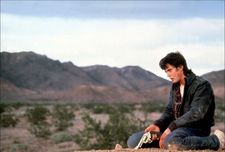 |
| C Thomas Howell in The Hitcher |
We talk about his background in cinematography, and how the landscape photography is not just beautiful but is also telling us just how isolated the characters are.
“I actually think that those landscapes have a lot to do with the film's longevity,” he says. “We were shooting in anamorphic 2:35 format and were, by design, in some really fantastic looking places. Those expanses with these looming mountains in the background were carefully chosen. There was some questioning because those take time – to get a camera out there, shoot the scene in the diner and all that stuff. And then we dropped back, I don't know, 600 yards back. That's an hour to get back there with a camera and a crew and organise everything. Everyone's walking. It's a cut in the film. You don't think about it, but it's a 12th of your day.
“I kept saying ‘We gotta do it. We gotta do it,’ because it gives this, just as you said, nowhere. But to me – I’ll wax poetic for a second, because I can't help it – those mountains, which we know have been there for hundreds of thousands, if not millions of years – I always felt they were looking down on these characters. And if they had, if mountains had heads and brains, they'd be saying ‘These guys, what do they think they're doing? They're only alive for a blip. What does it all mean? And we're never going away. We don't care.’ You know, the mountains don't care about that stuff right in front of them. I know it sounds almost ludicrous, but I think there's something to that concept.”
Age is a factor in the film as well, on a different scale, because it does feel a bit like a coming of age film, and the age difference in the central characters is important. Is that partly why he cast C Thomas Howell? Because although he's just the right age to be able to drive a car and do what he's doing, he seems very young in a lot of ways, very boyish.
“I totally agree. And in addition, if Tommy hadn't driven down that highway, Rutger wouldn't have been standing there. But I also have always said ‘Tommy’ – and I still believe this – ‘if you play this right, we will understand that when it's all over and you're standing there in silhouette against the sun, lighting up one last cigarette, if somebody, if a genie could pop out of a bottle and say “Mr Halsey, you have a choice to make. I can make this like it never happened. I'll put you back in that car, driving down that road, and you will not see that guy and none of this will have happened. I can do that for you if you'd like.” And we should understand that you would absolutely say “No, thanks. I'm better off for it.”’ So I think you've also captured that sense that it's totally coming. It's his whole body movement and demeanour.”
I tell him I heard that the poor lad was actually afraid of Rutger Hauer.
“Well, he always said that. I never knew that. I never knew he felt that way, but I was, too.
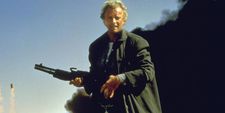 |
| The Hitcher |
“He was relatively green as an actor, but not as green as I was as a director. And Rutger, you know, he can be intimidating if he chooses to be, but also he was a very tall guy, hands the size of...” He pauses, having raised his own hands to try and mime his point. “I know I'm speaking to British people, but if you want to catch what it looks like in baseball, that crazy American sport that nobody understands – but you have cricket, which is equally....”
I assure him that I don't understand cricket.
“I'm happy to hear that. So he's just sitting there. He can be intimidating, just on a physical basis.”
Did he have a very strong vision for how he wanted to play the character when he came on board?
“He certainly had a lot of ideas.”
He hesitates, asking if it’s okay to share a story, and I say that’s fine by me.
“I had just been hired. Rutger had just been hired. I happened to be in a party at Jennifer Jason Lee's house, for Flesh And Blood, directed by Paul Verhoeven, the Dutch director. And so I met Paul for the first time at that party. It was weeks before we were going to start shooting, and we met. Paul said, ‘Oh, Robert Harmon, I think I know that name. Aren't you directing Rutger’s next movie?’ And I said ‘Yeah, I am.’ He said ‘Is it correct that it's your first film?’ And I said, ‘Yes, it will be.’ And he started laughing like, those things just don't go together. I said, ‘I'm already nervous enough. What's so funny?’
“He said ‘Oh, no, you'll be fine. But you have to understand, with Rutger, he will have an idea and a concept for every moment of every scene. And I said ‘Well, that sounds good to me because I'm new at this, and if I don't have any ideas, I'll be happy he does.’ And he said ‘No, you don't understand. Rutger will be convinced that all million of those ideas are pure genius.’ So he made me even more nervous. And it was true. But Rutger was fine with it. He did have a lot of ideas, most of which were fantastic. He's so good in the movie and such a wonderful actor. But for me as a first time director, it was a real lesson in how to say no 40 times a day without making him feel like he wasn't being listened to, because he was.”
When you have a first film which has the power that this one does, even if it wasn't immediately commercially successful, how does that shape the rest of your career? How do you go on from there?
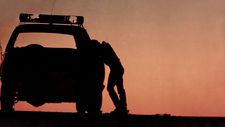 |
| The Hitcher |
“Well, in my case, it shaped my career by my making a whole series of dumb moves after that,” he confesses. “I think I was so startled by the things that were being offered, and I turned them down. I turned down some movies that turned out to be giant hits and would have been smarter had I done them. But it opened a lot of doors.”
Is there anything you would do differently if he were making The Hitcher today?
“That's a good question. Well, there are scenes in it I think I could direct better, but I don't know. Especially considering the notoriety it's achieved and maintained all these years, it would be pretty silly, pretty foolish to change too much.
“I remember John Seale, who was a very experienced Australian cameraman, who had just shot Witness with Ed Feldman, which is why he ended up on my movie when he was back in Australia during all of our post production. And when he finally came back to LA to do something, Ed Feldman said ‘Let's set up a screening for John. We should show him the movie.’ And we did. And he said, I knew there was something going on as were making this movie. I knew it was going to be very different and great.’ He was very happy with it, and I was very gratified to hear that as a first time director. He had probably done 30 movies by that time in Australia. But still then he said ‘I smelled it when were making it.’”





















